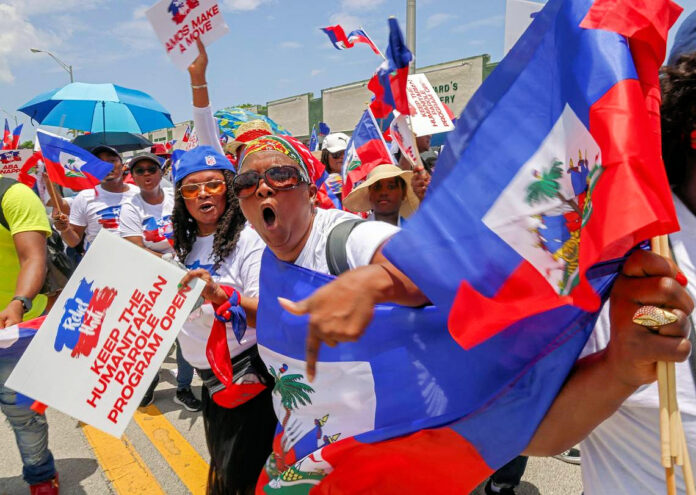
(Français)
Fifteen and a half years ago, on Jan. 15, 2010, President Barack Obama granted Haitians in the United States Temporary Protected Status (TPS) following the 7.0 magnitude earthquake that struck the Port-au-Prince region three days earlier, killing tens of thousands.
Since that time, there were several attempts to revoke the status for Haitians, the most serious of which came in 2017 when the first Trump administration tried to cancel it, but the move was effectively stopped by several court rulings, most importantly Saget et al. v. Trump, the 2018 suit brought by Haïti Liberté, the Family Action Network Movement (FANM), and nine TPS recipients in federal court. As in other rulings, Federal District Judge William F. Kuntz II issued an injunction blocking Trump’s bid to end Haitians’ TPS.
But now, the second Trump administration has resumed their campaign. On Jun. 27, U.S. Secretary of Homeland Security (DHS) Kristi Noem announced that TPS for over half a million Haitians now legally living and working in the U.S. “expires on Aug. 3, 2025, and the termination will be effective on Tuesday, September 2, 2025.”
TPS is normally renewed by the executive branch every 18 months, but Noem’s cut-off date comes six months early. To end Haitians’ TPS, she is legally obliged to wait until the Haitians’ current TPS term ends in February 2026. Then she could decide not to renew it, but given Haiti’s dire problems, that would be wrong, advocates say.
“This is a cruel, unjust, and politically motivated decision that blatantly ignores Haiti’s devastating and worsening conditions,” said Paul Christian Namphy, FANM’s Political Director. “Haiti is currently enduring a catastrophic humanitarian crisis marked by rampant gang violence, political instability, hunger, and a total collapse of public services. Forcibly returning people under these circumstances is not only reckless — it is inhumane.”
The premature TPS termination comes on the heels of Trump’s cancellation, in March, of the Cuba, Haiti, Nicaragua, Venezuela (CHNV) program, under which the Biden administration granted a two-year parole to migrants fleeing economic collapse, political instability, and violence. About 96,000 Haitians who had come to the U.S. under the “Biden visa” became illegal with only one week’s notice.

Ironically, even Jimmy “Barbecue” Cherizier, the principal leader and spokesman of the Viv Ansanm (Let’s Live Together) political party (which U.S. Secretary of State Marco Rubio designated as a “foreign terrorist organization” in May), has forcibly condemned the Trump administration’s yanking of TPS and CHNV from Haitians.
“This move by Trump is going to cause real hardship and chaos in Haiti if we can’t stop it,” Cherizier said during a four-hour long livestream interview with journalist and commentator Ralph Laurent on his YouTube program Live Tanbou Verite a. “Lots of people count on the remittances sent by their family with TPS, as they did for the Biden [CHVN] program, to pay their university, rent, or even food. Some people who were eating once a week could then eat twice a day. Without that lifeline, they now are going to have to turn for help to the so-called ‘gangs,’ because they have to live.”
So the very neighborhood armed groups that the U.S. State Department points to as the source of all of Haiti’s problems will now have more people turning to them for help and survival.
Haitians in the U.S. who have won permanent residency or even U.S. citizenship are also adversely affected. Thousands of Haitian TPS holders in New York, Philadelphia, Atlanta, and South Florida work as home health aids (HHA) and certified nursing assistants (CNA) in the homes of their low-income compatriots. Many others work as cooks, waiters, and cleaners in Haitian restaurants. These TPS Haitians are now trying to figure out whether or how they will return to Haiti or try to stay on as an undocumented immigrant in the U.S..
“It’s a very difficult choice for me,” one woman TPS holder told Haïti Liberté. “I have to take into account the situation not just for myself but for my children, who were born here. And if I were to return to Haiti, I don’t even know where I would live at this point, and on such short notice.”
While forcing Haitians to return to their destabilized nation, Washington had its Embassy in Haiti tweet out a “Message to U.S. Citizens” on Jun. 24 in which it ominously warned that “U.S. citizens in Haiti should depart Haiti by commercial or other privately available transportation options when they feel it is safe to do so. U.S. citizens should monitor local news and check regularly with travel agencies and commercial transportation providers’ offices and webpages to find departure options that suit their needs… Do not travel to Haiti. If you are a U.S. citizen in Haiti: Depart Haiti as soon as possible by commercial or other privately available transportation options. Avoid crowds. Monitor local media for updates and avoid areas where violence, demonstrations, or disruptions are reported to be happening. Keep a low profile. Be aware of your surroundings. Be prepared to shelter in place for an extended time period. Avoid being outside after dark. Stay alert. Review your personal security plans.”
There are no commercial flights to Port-au-Prince, the nation’s largest airport, with only exorbitantly expensive and intermittent international flights to Cap-Haïtien, a five-hour drive over difficult, insecure roads from the capital. Thus the return of 521,000 Haitians to their homeland is challenging, to say the least.
“It is especially unconscionable to revoke TPS while simultaneously acknowledging the complete breakdown of governance and security in Haiti,” said Rachel Descollines, FANM’s Social Justice Organizer.
Legal fight-back efforts, like those during the first Trump term, continue. On Jul. 1, U.S. Federal District Judge Brian Cogan (appointed to the bench by George W. Bush) ruled that Noem “does not have statutory or inherent authority to partially vacate a country’s TPS designation,” as she did by ending Haitians’ TPS six months early. This makes her actions “unlawful,” Cogan wrote. “Plaintiffs are likely to (and, indeed, do) succeed on the merits.”
The Trump Administration has already said it will appeal Cogan’s injunction. DHS spokeswoman Tricia McLaughlin said that the ruling will just “delay” Haitians’ TPS cancellation, and “we expect a higher court to vindicate us.”
On Mar. 14, nine Haitian TPS holders, the Haitian Evangelical Clergy Association, and SEIU-32BJ sued the Trump Administration for prematurely halting TPS, saying Noem did not do a required review of current conditions in Haiti.
“Trump and Noem’s actions are illegal under the TPS statute and our international promise that we will never return people to countries where their lives or freedom are threatened,” said Ira Kurzban of Kurzban Kurzban Tetzeli & Pratt, one of the firms representing the plaintiffs. “The actions challenged in this complaint represent a depth of cruelty typical of authoritarian and fascist governments but inconsistent with our values and history as a welcoming nation.”
Those defending Haitians realize that fighting Trump’s offensive against TPS is likely to be harder this time,
As Reuters noted in a Jul. 1 report: “Noem shares Trump’s hardline stance on immigration issues and also moved to end TPS for about 350,000 Venezuelans as well as thousands of people from Afghanistan and Cameroon. On May 19, the U.S. Supreme Court let TPS end for the Venezuelans, signaling that other terminations could be allowed.”










[…] This Time, Trump May Succeed in Ending 521,000 Haitians’ TPS Haiti Liberte […]
[…] (English) […]